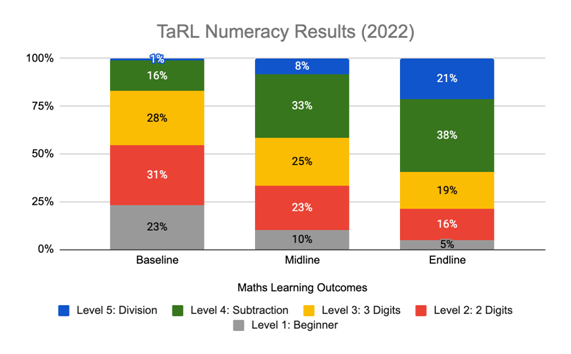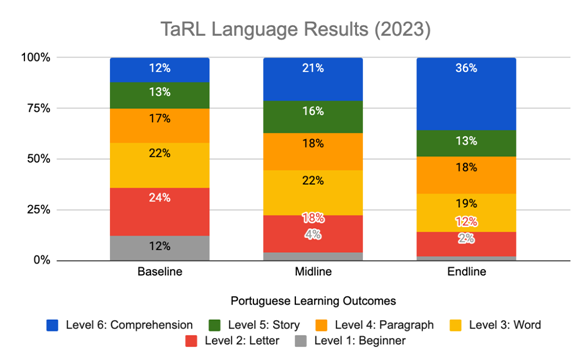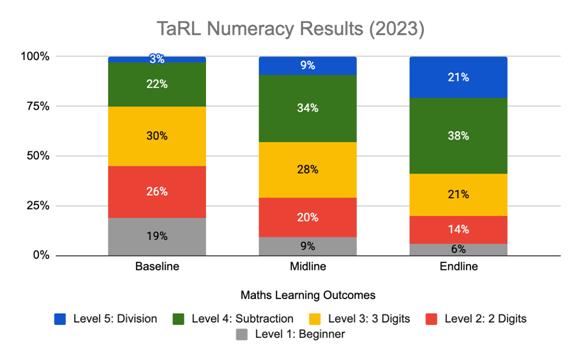Brazil
TaRL interventions in Brazil: A collaboration with Pratham and Motriz
Even before the COVID-19 pandemic hit the world, children could complete five years of school without acquiring foundational skills in reading and math. With forced school closures during the pandemic in over 188 countries including Brazil, there were extrapolations that this trend would become grimmer. Now, although schools are reopening, children in several regions across Brazil continue to face challenges with acquiring foundational literacy and numeracy skills.

In 2021, recognizing this crisis in learning, Motriz (formerly Instituto Gesto) approached Pratham for technical assistance in adapting TaRL to the Brazilian context. Motriz wanted to implement the approach through the existing public education system in the country and help children “catch up” in a short period of time. Resulting from the merger between Instituto Gesto and Vetor Brasil, Motriz is a non-profit organization whose purpose is to strengthen the Brazilian executive power so that it delivers quality services to all people in Brazil, with ethnic-racial equity, gender equity, and socio-environmental sustainability.
Currently, Motriz is the primary coordinator and funder of the project, tracking program implementation and ensuring that the TaRL intervention is adapted to local realities. To further assist with quality delivery, Motriz has partnered with Elos Educacional, a Brazilian education consultancy that focuses on teacher training. Individuals from Elos not only cascade TaRL training to the selected schools but also provide ongoing mentoring support to the teachers implementing the pilot — an essential component of a TaRL intervention.
Thus far, the Pratham Team has supported the pilot remotely, providing technical inputs for activities such as finalizing a pilot design, developing context-appropriate materials and assessments, and building capacity on the approach through remote TaRL training. Our team also provides Motriz and its partners with ongoing guidance and mentorship through regular check-ins.
Implementation

TaRL pilots in Brazil
In 2022, these interventions reached ~100 schools and over 2200 learners. After a program design workshop in November 2021, Motriz identified Amapá as one of the first pilot areas considering the local characteristics of the territory. Following Amapá, TaRL interventions were also conducted in five more geographies in Brazil including Sergipe, Taubaté, Ulianópolis, Rio de Janeiro, and Moju. Across different states and territories in Brazil, TaRL interventions are conducted for approximately ~90 implementation hours, with 45 implementation hours each dedicated to both Math and Portuguese. These sessions are delivered by teachers during or after school hours depending on the area of implementation.
Efforts are underway to also train a core team from the educational department of the respective geographies to become leaders of practice i.e. master trainers and mentors. To do so, currently, one semester is dedicated to training the team and for them to practice the TaRL approach themselves. The second semester is dedicated to mentoring the education department team as they train teachers and visit schools.
Phased transition to a government-led model
The adaption of TaRL to Brazil’s decentralized education system has been a unique experience. For instance, education departments of states or municipalities have autonomy in delivering primary education. Thus, TaRL interventions have been piloted independently in different geographies within Brazil and have been contextualized to suit local needs and realities. Although these models of delivery have differed, the core principles of the TaRL approach have been uniform across contexts.
Furthermore, the decentralized nature of the projects in Brazil allowed Motriz and Elos to build capacity on TaRL in a phase-wise manner. In the initial phase, which lasted approximately 49 hours of implementation time in Portuguese and 49 hours in Math, Elos and Motriz played a more significant role in supporting the program’s implementation. Efforts were made to introduce the intervention to local government officials and gradually integrate them into the pilot’s delivery. As the program progressed into phase 2 in some geographies in 2023, the focus shifted towards a government-led model, aiming to capitalize on government actors’ involvement to undertake key mentoring and monitoring responsibilities.
Scale up in 2023
In 2023, TaRL interventions were scaled to 309 schools across the education systems of one state and seven municipalities in Brazil and reached 8752 learners. On average, ~80 hours of implementation was conducted for both language and mathematics during the intervention cycle. In Moju (PA) and Ulianópolis (PA), the intervention was in Phase 2 of its implementation, leading to local Secretariats performing monitoring and training roles.
Results
Results from 2022
In 2022, TaRL interventions (In Phase 1 i.e. NGO-led phase) demonstrated significant progress in children’s learning outcomes after ~90 hours of implementation.


Graph: Leaning outcomes for ~2200 learners after approx. 49 hours of implementation for language and maths in Brazil in 2022
At the end of the interventions in 2022, the proportion of learners who could not read sentences reduced by 28 percentage points from 43% to 15%. The proportion of learners who could at least read phrases increased by 33 percentage points from 30% to 63%. A similar improvement was observed in learning outcomes for Numeracy. At the end of the intervention, learners who could at least do subtraction increased by 42 percentage points from 17% to 59%.
Results from 2023
In 2023, TaRL interventions (In Phase 1 i.e. NGO-led phase) demonstrated significant progress in children’s learning outcomes after ~90 hours of implementation.


Graph: Leaning outcomes for ~8700 learners after approx. 40 hours of implementation for language and maths in Brazil in 2023.
There was a 25 percentage point improvement in the proportion of learners who could at least read a simple paragraph at the end of the intervention, growing from 42% at Baseline to 67% at Endline. Furthermore, the proportion of learners who could at least solve subtraction problems increased from 25% at Baseline to 59% at Endline — a 34 percentage point increase at the end of the intervention.
Upcoming activities
As of February 2024, plans are underway to determine which geographies may want to expand TaRL interventions in their states and/or municipalities. Conversations between Pratham and Motriz are also underway to plan for continued capacity building and enhanced delivery of TaRL interventions in Brazil.
